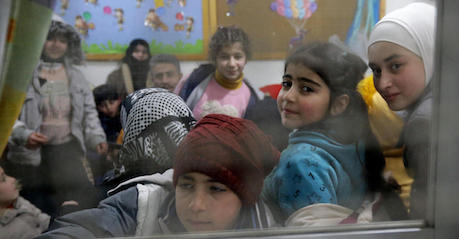Search and rescue efforts continue in Syria and Turkey amid aftershocks in the wake of a major earthquake that killed more than 5,000 people and destroyed thousands of homes, schools and other buildings in the early hours of Feb. 6.
Speaking from the UNICEF office in Aleppo on Feb. 7, Angela Kearney, UNICEF Representative in Syria, told the Today Show how UNICEF is responding to the large and growing needs of children and families impacted by the quake.
“It happened at 4:15 in the morning on a winter’s night, so it was very cold, very wet and people were very traumatized,” she said. “The buildings came down and we’ve had lots of aftershocks as well. So it’s a very difficult situation, very tragic, in a country that is already struggling with humanitarian needs.”
The needs of children affected by the quake are huge and growing fast
Angela Kearney, a UNICEF representative, tells TODAY what she has witnessed in the aftermath of the massive earthquake in Turkey and Syria and shares what the biggest needs are for survivors. pic.twitter.com/iKYQTvBJ9v
— TODAY (@TODAYshow) February 7, 2023
UNICEF puts children first in emergency response
Ensuring that children are safe and secure is a top priority for UNICEF. “Many families have had to go into shelters and most of those are schools, the ones that are not damaged,” Kearney continued. “So families are there seeking shelter. They can’t go back to their apartment buildings, especially with the aftershocks.”
“Those children need food, they need water, they need sanitation. They need winter clothes, because most of them just fled their apartments in the middle of the night with nothing… [T]hey need medical care. It’s very easy to get respiratory tract infections in this wintertime. So the needs are just great.
“The ones that are displaced into the schools may be the lucky ones. The other ones spent a couple of nights outside in this winter. So it’s stepping up to find safe places for families to go to and receive the humanitarian assistance. The needs are absolutely huge.”
On Feb. 6, 2023, an injured child awaits treatment at the Bab al-Hawa hospital following an earthquake in the northern countryside of Syria’s Idlib province on the border with Turkey. © UNICEF/UN0778529/Watad/AFP
UNICEF providing child protection, safe water, emergency supplies
UNICEF teams are working to protect unaccompanied children and reunite those who have become separated from their families. UNICEF is also conducting rapid needs assessment to determine the extent of damage to water systems and water storage facilities, and delivering safe drinking water to shelters by truck.
Water and sanitation remain a key priority; a cholera outbreak that began in September 2022 could become endemic if communities do not have access to safe water and functioning sanitation systems.
For Syria’s children, a crisis on top of a crisis
Even before the earthquake, children in Syria were already iliving through a humanitarian disaster caused by the ongoing civil war, economic crisis and the COVID-19 pandemic. UNICEF works with an established network of 17 NGO partners to deliver urgently needed supplies and services across northwest Syria. UNICEF also leads the coordinated multi-agency UN response in four areas: water, sanitation and hygiene (WASH), protection, nutrition and education.
In Turkey, UNICEF is supporting search and rescue efforts and distributing hygiene kits, blankets and warm clothing to children and families affected by the quake. At this time, the Turkish government has not requested international humanitarian assistance.
Your donation can help UNICEF reach more children in Syria with critical emergency aid. Please donate.
Top photo: On Feb. 6, 2023, Syrians gather at a convent to spend the night as they fear more tremors following a deadly earthquake in Aleppo. The Syrian government urged the international community to come to its aid after thousands died in the country following a 7.8-magnitude earthquake in neighboring Turkey. © UNICEF/UN0778264/Beshare/AFP
